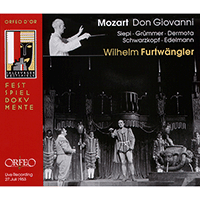Raffaele Arie
Initially Arié intended to become a violinist, but turned to singing following study with the baritone Cristo Brambaroff in Sofia. He made his concert début there in 1939, in Handel’s Messiah. In 1945 he was engaged by the Sofia Opera and during the following year he won first prize in the Geneva International Singing Competition. Following further study in Italy with Riccardo Stracciari, Apollo Granforte and Carlo Tagliabue he made a successful début at La Scala, Milan, as the King in Prokofiev’s The Love for Three Oranges in 1947. He appeared at La Scala frequently, for instance singing Varlaam/Boris Godunov (1949) and Konchak/Prince Igor (1952), as well as in the first performances of Lodovico’s L’Uragano (1952) and Ildebrando Pizzetti’s Clitennestra (1965).
From the late 1940s onwards Arié embarked on an international career: singing regularly at the Aix-en-Provence Festival between 1949 and 1956 (Commendatore/Don Giovanni, Osmin/Die Entführung aus dem Serail, Basilio/Il barbiere di Siviglia); with the New York City Center Opera between 1950 and 1952 (Leporello/Don Giovanni, Mephistopheles/Faust (Gounod)); and at the Salzburg Festival (Commendatore, 1953; Grand Inquisitor/Don Carlos, 1960 and 1961). In 1951 Arié created the rôle of Trulove in the world première of Stravinky’s The Rake’s Progress in Venice. He appeared with the Paris Opera during 1954 and 1955 (Sarastro/Die Zauberflöte, Boris Godunov) and with the Vienna State Opera between 1960 and 1968 (Ramphis/Aida, Padre Guardiano/La forza del destino, Timur/Turandot); as well as at Bordeaux, Lyons, Marseille, Nice, Monte Carlo (Fiesco/Simon Boccanegra, 1961), Amsterdam, Hamburg, Stuttgart, Geneva, Zürich, Buenos Aires, Mexico City, Chicago, New Orleans and Philadelphia. A frequent soloist in concert and oratorio, Arié was a notable exponent of the solo bass part in Verdi’s Requiem: he may be both seen and heard in a legendary 1964 performance of this work from the Royal Festival Hall, London, conducted by Carlo Maria Giulini. Following his retirement he taught singing at the Rubin Academy of Tel Aviv University, Israel.
Arié, like his compatriots Boris Christoff and Nicolai Ghiaurov, possessed a splendid voice which he used with taste and refinement. He appears on several commercial studio recordings of the early 1950s with Maria Callas and Renata Tebaldi, as well as in two recital discs produced by Decca (available online from the Naxos Classical Archives) and in a variety of off-air and unofficial recordings.
© Naxos Rights International Ltd. — David Patmore (A–Z of Singers).

















